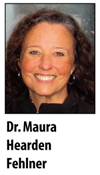November 10, 2021 Editor’s Note: Author, teacher, public speaker, and radio talk show hostess, Dr. Maura Hearden Fehlner earned her Ph.D. in Religious Studies from Marquette University after earning bachelor’s and master’s degrees in theater; she has been teaching theology to college students for nearly two decades. She and her husband, Deacon John Fehlner, reside in Keene. By Dr. Maura Hearden Fehlner There has been a great deal in the news of late about disturbing public displays of cruelty. In addition to actual criminal behavior, our children worry about bullying – especially cyber bullying – and adults worry about cancel culture. Public figures who fall from grace are objects of unbridled ridicule and ordinary people who hold the “wrong” political or social opinions are often quite literally afraid of speaking their minds. Increasingly, fear and hostility seem to dominate public sentiments. How do we, as Catholic Christians counter this culture of cruelty? At first, this factor might seem rather disconnected from the problem of cruelty. After all, Americans have traditionally regarded religious neutrality within our civil institutions as a safeguard against religious persecution – and there’s a good deal of truth in that idea. It is dangerous for both the Church and the state to mix institutional authorities for a variety of reasons, not the least of which is an increased risk of totalitarian control over individual consciences. However, making a formal distinction between our civil institutions on the one hand and our religious institutions on the other, is not quite the same thing as striving for religious neutrality in the public square. I would argue that, while the former is a good idea, the latter is a very bad idea and, ultimately, impossible. Human beings may not all practice a particular, formally recognized religion, but we are all inherently religious creatures. We all want to know the answers to ultimate questions about life in the universe: Does God exist? If God exists, what is God’s relationship with creation? What does this mean for the way I live my life? These are religious questions, and our answers to them determine what we think about everything else including the way we structure our relationships with other people, communities, and the environment. They also determine what we think about law, politics, education, art, economics, technology and science. The answers that we give to religious questions form the very core of our personal and cultural identities. They cannot be artificially extracted from our hearts and minds when we enter the public square. Nor should they be. More often than not, our efforts to maintain religious agnosticism or neutrality in the public square involve functioning as though God does not exist. We seem to think that cutting the whole idea of God out of the public square is the best way to avoid taking a position on the God question. The problem with this idea is that, when we function as though God does not exist, we have already answered the God question. We have said, “God does not exist.” The resulting phenomena is “functional atheism.” Many of us might believe in God when we are in Church or in the privacy of our own homes, but, in every other aspect of our lives, we function as though He does not exist. Functional atheism undermines civility in dramatic ways because it eliminates any moral standard that might transcend individual or group preferences. If there is no transcendent standard to which people can appeal when conflicts arise, there is no way to settle disagreements other than by making an appeal to power. Power can take many different forms: physical, financial, social, political, the power of the majority, etc., but, in a society without God, power will win the day. Might will make right. This is the very definition of tyranny. In this system, the bully wins. Our “religiously neutral” public square is a functionally atheistic space that relies on brute force to establish order and this reliance on brute force is spilling over into our personal interactions. It is creating a culture of cruelty. What is the remedy? Public sanctity. We must live our religious beliefs in the light of day and re-inject Christianity into the public square by consciously allowing our faith to direct our behavior. As confirmed Christians, it is our job to pray, dialogue, and provide public witness to Truth. There are many loving and respectful ways to do this. We can make sure that we pray over meals, making the sign of the cross even when we’re at a restaurant. We can make a conscious effort to recognize God’s direction and blessings in our own day-to-day routines and share those insights with our children and family members. We can place Catholic art inside and outside of our homes and wear our medals and crucifixes where people can see them. And, of course, we can share our beliefs with those who are willing to listen. The world needs Christ to be its best self. In the words of Gaudiem et Spes, “Christ, the new Adam, in the very revelation of the mystery of the Father and his love, fully reveals man to himself and brings to light his most high calling” (§22). When we reject Christ, we lose our humanity. When we embrace Christ, we gain a better life in this world and the next. |
||||


